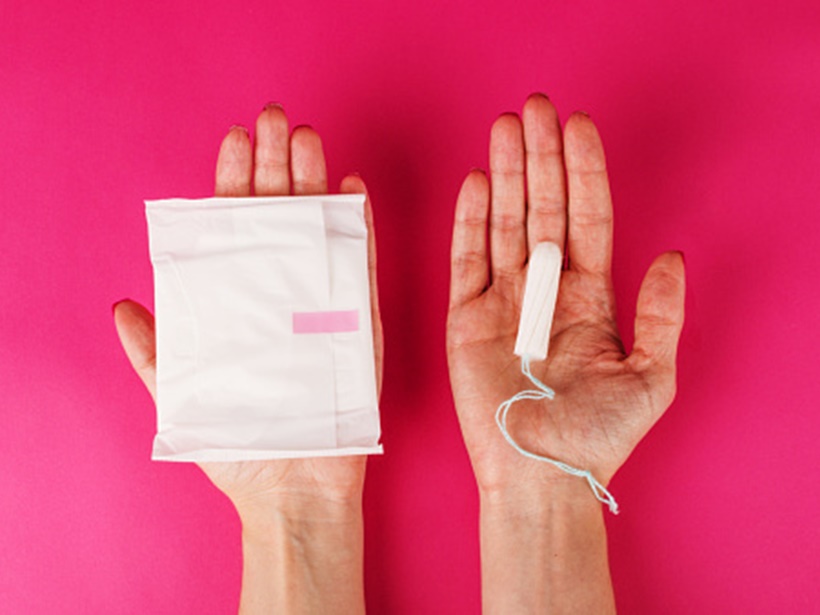Difficult Conversations: Let’s talk about menstruation, with girls and boys
Menstruation has always been plagued by euphemisms-Aunty, Aunt flow, those days, chums, and many more. Recently, while talking about body parts, we had discussed how it is essential to name the body parts by their actual names. The same logic holds here too.
 Talk to your kids about menstruation. (Source: Getty Images)
Talk to your kids about menstruation. (Source: Getty Images)
The girls will have their periods eventually and the boys would be confused about girls suddenly refusing to play on a certain day. Start early and arm them with more information.
By Tanu Shree Singh
I was around 11 years old and alone. Mum, Dad had left before I got up. It was summer holidays and we were camping at this place where the entire extended family had congregated. One fine morning, all the elders had left, barring one poor grandmother who was in-charge of the whole battalion of kids. And there I was, just woken up to a big red stain on the bed. I had no idea what it was.
For the next two days, I thought I was going to die of Amoebiasis-that was the recent diorder that we had studied at school and the symptoms matched. Somewhat. That is how clueless I was. I could not talk to the already hassled grandma. And the parents came back late. By that time I was asleep after having spent most part of the day in the washroom. Next morning, I grabbed hold of my father and told him that I was going to die of Amoebiasis. He mumbled some half sentences and called out to my mom.
That was my introduction to menstruation. More than the trauma of being stuck with it forever, I was relieved. I wasn’t dying! Although my mum and I were fairly open about most things, decades later she confessed that she thought there was still time and so skipped the conversation. Hence, it becomes extremely important that we talk to our children (not just girls) about mensturation and dispel some myths around it! Let’s try and do away with some common dilemmas.
“There is still time”
Did the child come with a manual? No? Well, then time is only guesswork. Besides, it is not about the girl getting her periods, it is about any child getting curious. At four years, the younger one found my tampon box. And asked what they were. We opened the pamphlet and studied it. I ‘read’ it out to him in age appropriate words. ‘Women discharge some blood from their vagina every month to prepare the body for having a baby in case mumma wants to. It is not the same as an injury. The tampon is helpful in preventing the panty from getting dirty.’
‘They are like your diapers!’ he beamed and bounced along.
Even if they have miraculously escaped any references to menstruation, the girls will have their periods eventually and the boys would be confused about girls suddenly refusing to play on a certain day. I feel it is best to start early and orient them towards it and then as they grow older arm them with more information.
What do I say?
Fumbling with the right words? You are lucky to be born in the right time! There are whole lot of books and youtube videos that could help. My favourite has been the Menstrupedia Comic : The Friendly Guide To Periods For Girls. Apart from this, quite a few works of fiction and non-fiction exists around the theme. So grab a book and read with your child. Make sure that you do not hesitate and read it confidently, without hesitating or getting flushed cheeks.
Do I really need to talk to the boys about it?
Yes, you do. If we need a world where we understand each other, it is essential that we prepare them early. If we need our boys to be sensitive, we need to educate them. When my older one fetched a packet of sanitary napkins for me last month, he asked, “Mum, the entire population of women gets periods, rights?”
“Yup, unless they are menopausal, too young or facing some health issues. Why?” I asked as I tore through the multiple safety layers to get to the pack.
“Then why did the chap wrap them in a newspaper, and then secure them in a black bag? I felt like I was carrying forbidden goods.”
“That is how all of us mostly feel.”
He shook his head in disapproval. A few days ago, the younger one massaged my feet since I was dying of body ache. Both of them know. Both of them care. Both of them are hopefully sensitive to their female friends.
By not sharing information, we are making sure that we rob the boys a chance of learning to be sensitive, and being instrumental in change.
Shhhh! Let’s have our special name for menstruation!
Menstruation has always been plagued by euphemisms-Aunty, Aunt flow, those days, chums, and many more. Recently, while talking about body parts, we had discussed how it is essential to name the body parts by their actual names. The same logic holds here too. Why attach shame to a perfectly normal bodily function? We hide the napkin in the folds of our skirt, we mumble a secret code and generally dread the thought of being found out. The whole world knows that women get periods! So get over it and remove the shame.
Temples, pickles and the the big list of Noes
I was a rotten child. My grandmother once pointed out that I should stay away from the pickle jar in “those days”. I stuck my finger in the jar to prove a point. The pickle lasted us till the last bit of the masala was licked clean. The list of don’ts is painfully long and fairly outrageous. Let’s play a game! Make a list of all the don’ts you have grown up with. Now without using the words religion, tradition, and culture, try to give a logical explanation of them all. For eg., we can not go to the temple when we are menstruating because ______(your logical answer here)__________ Hint: Refer to science. If there is no explanation for any bizarre don’t, it probably is just irrelevant.
Menstruation is different from other bodily functions only because it is limited to women. Imagine if boys had a menstrual cycle of their own instead. Would there be a need to even talk about this? Would there not be huge billboard screaming the merits of one brand of sanitary napkins over the other in fairly clear terms? It is up to us. Do we not want to remove at least one factor from the lopsided world in order to walk a bit closer to equality? Our daughters and sons deserve to know. Have that conversation now. With both.
(The writer has a PhD in Positive Psychology and is a lecturer in psychology. She is also the author of the book Keep Calm and Mommy On.)



- 01
- 02
- 03
- 04
- 05



























